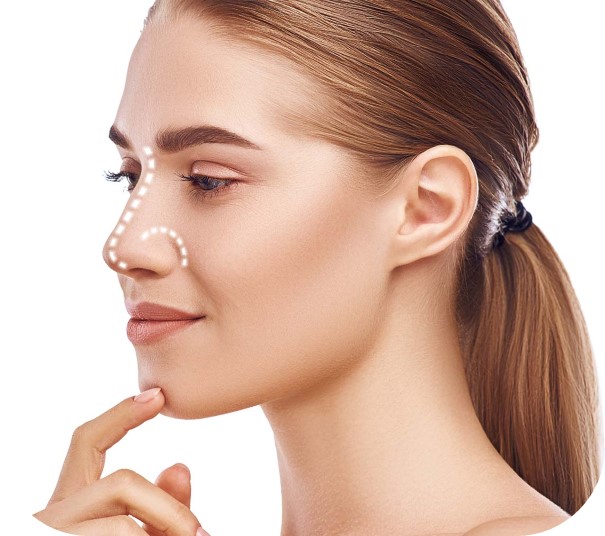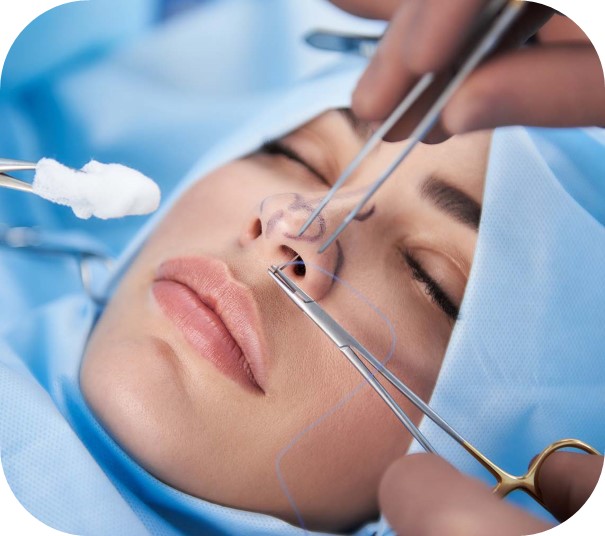










There are 2 different techniques of rhinoplasty surgery, closed and open:
Closed Rhinoplasty (Nose Aesthetics)
Closed rhinoplasty is also divided into two groups:
•In the first group, a piece of 3-5 mm is removed from the top of the nasal wing cartilage without seeing the nasal tip cartilages. Nasal bones are removed and the bones are narrowed. The duration of the operation is 1 or 2 hours. The results of this technique, on the other hand, are less controlled.
•In the second group, the nasal cartilages are straightened through the holes. Open techniques are used and nasal lights are reconstructed after the nasal bridge is removed.
In open rhinoplasty, on the other hand, completely surgical intervention comes into play. The tip of the nose is opened and lifted up and all problems become more visible.
It really depends entirely on your surgeon. After your nose structure is thoroughly determined by the surgeon, the most appropriate technique will be applied.
The biggest difference between the two techniques is that the bruising and swelling are less in the closed technique compared to the open technique.
Before the rhinoplasty surgery, the patient should undergo a medical health screening and the necessary analyzes for the surgery should be done so that a bad event that may occur during the operation should not be faced.

If there is a common cold or flu-like illness before the operation, such conditions may prevent the operation. He or she will want to get information about the diseases and surgical operations you have had before. It is very important that you provide any information, important or unimportant. Although it may seem insignificant to you, since an insignificant situation for you may be an important detail for your surgeon during the anesthesia control, it is useful to share every information with the specialist who will perform the surgery.
If the patient has routine medications, they should be shared with the specialist during the examination and information should be obtained about what needs to be done in this process. Before you go to talk to the anesthesiologist about the surgery, you can take the boxes of your medicines with you, or you can explain in detail what your discomfort is. Before the operation, drugs or food that will ensure the fluidity of the blood should not be used. About 10 days before the operation, the use of blood thinners should be stopped so that the risks that may occur during the operation are eliminated.
Since some of the herbal teas have a blood liquefying feature, the use of herbal tea should be discontinued about a week before the surgery.Women's menstrual periods are not an obstacle to plastic surgery, but it is your anesthesiologist who will decide whether this is a complete obstacle or not. Since smoking is a habit that delays the healing process of the wound, it is beneficial to quit smoking before the operation.
The use of these substances should be discontinued before almost all surgeries. It will be an initiative that will be beneficial even in hair transplantation before hair transplantation. At least 6 hours before the operation, it is necessary to leave food and drink and stay hungry.
 Process After Rhinoplasty Surgery
Process After Rhinoplasty SurgeryPatients generally do not have pain after surgery; However, some patients may experience minor pain. In this process, the patient is treated with painkillers.
Postoperative nasal congestion is observed in patients for up to two days. Due to nasal congestion, patients start to breathe through their mouths, which causes a constant dryness in the patient's throat. Plenty of liquid food supplements should be given so that the dryness of the throat does not disturb the patients.
It is necessary not to get out of bed for about 6 hours. The reason for this is the possibility of dizziness and blackout due to the fact that the effect of the anesthesia has not passed.
You should sleep on high pillows for approximately 15 days, avoid tilting your head and lie flat as much as possible while lying down.
In open surgery, stitches are placed on the tip of the nose. These sutures are removed under the control of the surgeon 1 week after the operation. After this stage, a tape is attached to your nose and you can remove the tape yourself after 1 week.
Right after the nose surgery is over, the patient should sleep as upright as possible, supporting his head with a pillow for the first 2 nights. With this application, the risk of edema formation in the patient is minimized.
Glasses may not be used during the first 4 or 6 months. Avoiding ball activities such as basketball, volleyball, and football will benefit the patient. Since there is a great risk in the nose as a result of a blow to the nose of the patient, the patient should definitely take this warning into account.

It is necessary to protect the nose area from the harmful rays of the sun for at least 90 days, ie 3 months. To protect from sunlight, high factor sunscreens should be used or you should go out in the sun with the use of a hat with a protective nose. In this process, permanent color changes may occur due to sunlight. Avoid being in the pool, sea and wet and humid environments such as saunas.
It can cause deformation in the nose as well as cause inflammation in the nose. Chlorine in pool water can cause irritation of sensitive nasal tissues. In the same way, excessive heat can damage the nasal tissue or sutures, as well as cause inflammation of the wound. In this case, it can play a role in the healing process of the wound.
Especially since diving into the pool or the sea is a behavior that can cause deformities in the nose, such attempts should not be made. These activities, which are performed for 4 or 5 months after aesthetic surgery, should be abandoned.
Patients who have habits such as alcohol and cigarettes should also stay away from these substances during the healing process so that the healing time of the stitches does not prolong. The substances in alcohol and cigarettes do not allow the regeneration of tissues, in this case, it may cause problems in patients.